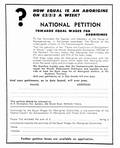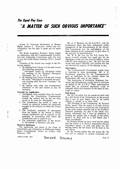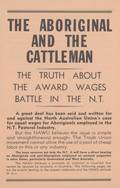North Australian Workers Union test case
The North Australian Workers Union application to vary the Cattle Station Industry (Northern Territory) Award 1951 to include Aboriginal pastoral workers was the first of three such awards to come before the Conciliation and Arbitration Commission in 1965. In a widely distributed flyer it set out the case for including Aboriginal cattlemen in the award.
This application was a test case. The majority of the 2500 pastoral workers, classified as wards under the Northern Territory Ordinance, were paid no more than £3.3.3 per week. The Equal Wages Committee opened its petition campaign with newspaper advertisements asking the public 'How equal is an Aborigine on £3.3.3 per week?' It pointed out that these low wage rates were inconsistent with stated policy that Aborigines should enjoy the same rights and privileges as other Australians.
Equal wages campaign: 'A matter of such obvious importance'
Eric Wicks (ed), Smoke Signals, Victorian Aborigines Advancement League, April-June 1965, pp. 15 & 17
More info on Equal wages campaign: 'A matter of such obvious importance'
In winter 1965 the Conciliation and Arbitration Commission heard evidence on the case in Alice Springs. Marjorie Broadbent, Equal Wages for Aborigines Committee treasurer, and a member of the Miscellaneous Workers' Union, travelled to Alice Springs to hear the arguments put by pastoralists and unionists and to encourage Aboriginal people to attend the hearings. No Aboriginal evidence was heard. Broadbent recalls:
And so - anyway the court case went on and I can't remember the name of the advocate for the Aboriginal people - Wood something. He was very good. And it was a tremendous battle. But I was sitting in the body of the court surrounded by Aboriginal people and they were angry. They were very angry. There was a murmur going up when the evidence was given that they were cruel to horses. It was - it just had been an appalling life. Many of them had just worked temporarily on these holdings and then came back. They were just told, 'right oh, bugger off!'. And they just had to leave, having received no wages at all. Go in the clothes you're standing up in and then walk home. No other worker in Australia had such conditions. Even the women who got half pay. Was disgraceful! [1]
The decision
In March 1966 the Commission brought down its long-awaited decision on the proposed variations to the Cattle Station Industry (Northern Territory) Award 1951. It agreed to the deletion of the clauses which excluded Aboriginal pastoral workers from the award but deferred the date of implementation to 1 December 1968. The Commission's judgment explained that this was to give Aboriginal workers and the Commonwealth 'time to prepare' for the change. It added, ominously, that it was also necessary 'to give the pastoralists an opportunity to consider the future of their aboriginal employees and to make arrangements for their replacement by white labour if necessary'. [2]
The Equal Wages Committee welcomed the removal of the discriminatory wording but found the judgment wanting on four counts.
- It was critical of the delay in implementation.
- It pointed out that no provision had been made for a wage increase in the interim.
- The judgment would apply only to Aboriginal workers who were members of the union.
- The recommendation that a slow workers' permit should be easier to obtain would lead to abuse. (A slow workers' clause would allow an employer to pay a worker at a rate lower than the industry award.)
The Equal Wages Committee held that if such a clause was to be accepted by the Arbitration and Conciliation Commission as applicable to the industry it could be used on cultural grounds, thus discriminating against Aboriginal pastoral workers en masse. [3]
The North Australian Workers Union held that an important union principle was at stake and that the union movement could not allow the use of a pool of cheap labour.
'The Aboriginal and the cattleman', North Australian Workers Union
Barry Christophers Papers, MS 7992/6/5 National Library of Australia, Canberra
More info on 'The Aboriginal and the cattleman', North Australian Workers Union
Related resources
Footnotes
1 M Broadbent, Federal Council for the Advancement of Aborigines and Torres Strait Islanders Oral History Project, 17 January 1997, p.7, Australian Institute of Aboriginal and Torres Strait Islander Studies, Canberra.
2 The Commonwealth Conciliation and Arbitration Commission, Cattle Station Industry (Northern Territory) Award 1951, 7 March 1966.
3 B Christophers, 'Aborigines Should Receive at Least the Basic Wage Now', press release, 29 August 1966, Barry Christophers personal papers.


